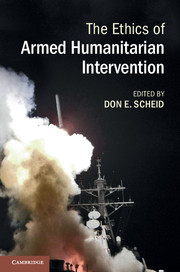Book contents
- Frontmatter
- Contents
- Notes on contributors
- Preface and acknowledgments
- List of abbreviations and acronyms
- Part I Intervention and debate
- Part II Moral perspectives
- Part III Ideas and reconsiderations
- 8 The costs of war
- 9 Armed humanitarian intervention and the problem of abuse after Libya
- 10 The responsibility to protect and the problem of regime change
- 11 Law, ethics, and the responsibility to protect
- 12 Responsibility to protect and the language of crimes
- 13 Post-intervention
- 14 Rethinking responsibility to protect
- Select bibliography
- Index
- References
10 - The responsibility to protect and the problem of regime change
Published online by Cambridge University Press: 05 June 2014
- Frontmatter
- Contents
- Notes on contributors
- Preface and acknowledgments
- List of abbreviations and acronyms
- Part I Intervention and debate
- Part II Moral perspectives
- Part III Ideas and reconsiderations
- 8 The costs of war
- 9 Armed humanitarian intervention and the problem of abuse after Libya
- 10 The responsibility to protect and the problem of regime change
- 11 Law, ethics, and the responsibility to protect
- 12 Responsibility to protect and the language of crimes
- 13 Post-intervention
- 14 Rethinking responsibility to protect
- Select bibliography
- Index
- References
Summary
The use of attack helicopters by the UN mission in Côte d’Ivoire (UNOCI) to oust Laurent Gbagbo from power in April 2011 and NATO’s decision to interpret Security Council Resolution 1973, passed a few weeks earlier, in such a way as to permit the use of airpower and other forms of assistance to aid the National Transitional Council of Libya in overthrowing the Gaddafi regime provoked a strong and negative response from some quarters in international society. Several states argued that, as a matter of principle, the protection of populations from genocide, war crimes, ethnic cleansing, and crimes against humanity (hereafter “genocide and mass atrocities”) should never entail “regime change.” Three members of the emerging “BRICS” (Brazil, Russia, India, China, South Africa) group – all of whom had moved over the past few years toward an accommodation with RtoP – spoke out strongly against the actions in Côte d’Ivoire and Libya. China, a permanent member of the UN Security Council, argued: “There must be no attempt at regime change or involvement in civil war by any party under the guise of protecting civilians.” Brazil concurred:
The protection of civilians is a humanitarian imperative. It is a distinct concept that must not be confused or conflated with threats to international peace and security, as described in the Charter, or with the responsibility to protect. We must avoid excessively broad interpretations of the protection of civilians, which could … create the perception that it is being used as a smokescreen for intervention or regime change.
And South Africa noted that: “international actors and external organizations … should nonetheless comply with the provisions of the United Nations Charter, fully respect the will, sovereignty and territorial integrity of the country concerned, and refrain from the advancing political agendas that go beyond the protection of civilian mandates, including regime change.” The expression of these sentiments led some analysts to argue that the UN Security Council’s failure to reach consensus on a timely and decisive response to the crisis in Syria was caused, to some extent, by the global discord generated by intervention in Libya.
Keywords
- Type
- Chapter
- Information
- The Ethics of Armed Humanitarian Intervention , pp. 166 - 186Publisher: Cambridge University PressPrint publication year: 2014
References
- 2
- Cited by

